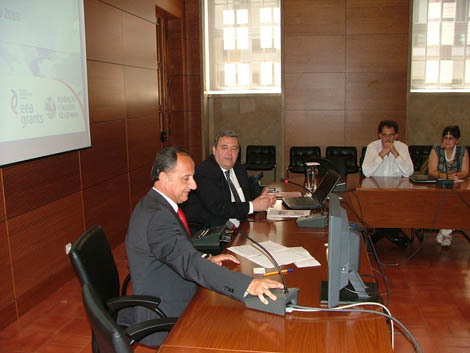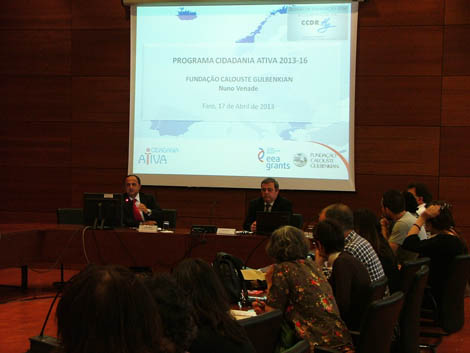 The public session for the presentation of the Active Citizenship Program/EAA Grants, an initiative of the Calouste Gulbenkian Foundation with the collaboration of CCDR Algarve, took place on April 17, in Faro.
The public session for the presentation of the Active Citizenship Program/EAA Grants, an initiative of the Calouste Gulbenkian Foundation with the collaboration of CCDR Algarve, took place on April 17, in Faro.
The president of CCDR Algarve welcomed all present, welcoming this important initiative for international financial support to non-governmental organizations in Portugal (NGOs), defining them as social or cultural institutions promoted by social groups organized, non-profit, formally and autonomously constituted.
David Santos referred to the high importance of these organizations in the practice of citizenship, as they call for reflection and action on the problems in our society. He also mentioned citizenship as something that concerns everyone, important for our society, for human rights, namely the values of equality, democracy and social justice.
The representative of the managing entity of the Program, Nuno Venade, then started the public presentation of the Active Citizenship Program, which aims to support Non-Governmental Organizations (NGOs), under the Financial Mechanism of the European Economic Area. Its overall objective is to strengthen Civil Society as well as its contribution to social justice, democracy and sustainable development.
The Active Citizenship Program/EAA Grants is supported by Norway, Iceland and Liechtenstein, after an agreement with the Portuguese government, for a total of 5,8 million euros, which will be awarded between 2013 and 2016.
 According to Nuno Venade, from the Calouste Gulbenkian Foundation, the first phase of the support competitions opens on April 29 and runs until July 1, covering projects from €10 to a maximum of €125. be funded up to 90% of eligible expenses and spent by April 30, 2016.
According to Nuno Venade, from the Calouste Gulbenkian Foundation, the first phase of the support competitions opens on April 29 and runs until July 1, covering projects from €10 to a maximum of €125. be funded up to 90% of eligible expenses and spent by April 30, 2016.
Portuguese NGOs (Non-Governmental Organizations) will be able to access the Program through annual competitions, with strict access rules and analysis criteria, meeting the pre-required requirements (www.cidadaniaativa.gulbenkian.pt).
Party organizations or political parties, or religious organizations will not be considered candidates.
Part of the funding (20%) will be allocated to partnerships between NGOs and public authorities in order to strengthen their participation in the design and implementation of public policies at national, regional and local levels.
Another percentage (40%) will be attributed to “the promotion of democratic values, including the defense of human rights, minority rights and the fight against discrimination”.
The remaining amount (40%), around 2 million euros, will be earmarked for “strengthening the effectiveness of the action of NGOs”.
The program also supports initiatives aimed at deepening bilateral relations between Portuguese NGOs and entities from funding states and intergovernmental organizations, as well as international actions such as seminars, conferences and training courses.
For more information see: www.cidadaniaativa.gulbenkian.pt; by e-mail [email protected]; or by calling 217 823 660.

















Comments